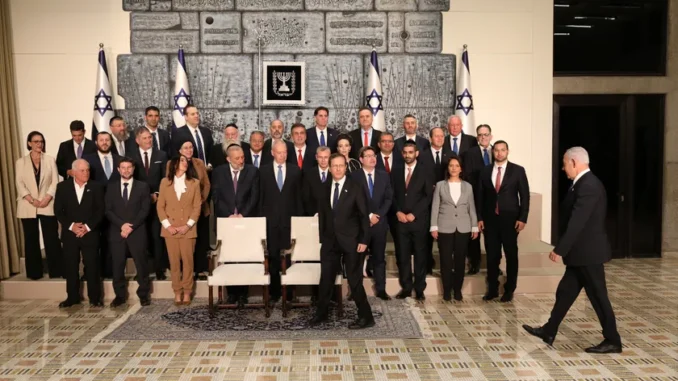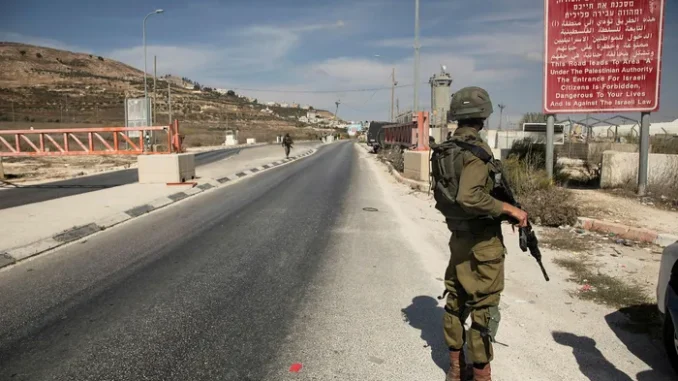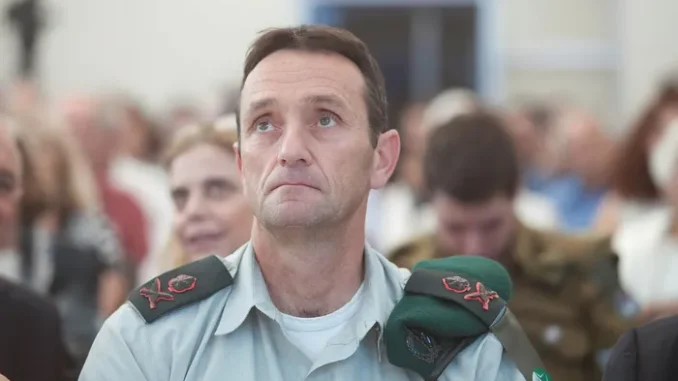T.Belman. Doesn’t sound like a loyal opposition to me.
It’s easy for journalists to get sucked into trolling attempts and the reassuring messages of the new coalition regarding LGBTQ rights, but the real dangers are in a combined judicial revolution and military crisis
By Amos Harel, HAARETZ Jan 1, 2023

Prime Minister Benjamin Netanyahu’s government being sworn in, Thursday.
A decade ago, the documentary filmmaker Dror Moreh used the term “gatekeeper” to describe the role of six former heads of the Shin Bet security service in protecting Israeli democracy from terror threats and, paradoxically, from the ethical consequences of the war on terror. The use of the term in Israel has expanded since then, and is often invoked in regard to the struggle to maintain the independence of the legal system.
In the context of Prime Minister Benjamin Netanyahu’s ongoing prosecution for corruption, judges, senior prosecutors and police detectives have been cited as defending the judiciary and the system of government from a right-wing onslaught in service of the accused.
The conversation surrounding gatekeepers will be renewed, and to a heightened degree, in the face of the far-reaching legislative initiatives planned by Netanyahu, lawmakers from his Likud party and their coalition partners in the new government. The willingness of prosecutors and judges to come forward in order to defend principles they view as vital will be tested in the face of the anticipated legislative tsunami. This confrontation will not affect the defense establishment directly, but certain reciprocal relations between figures at the top of each organization are likely.
If we do in fact experience legislative chaos, combined with rapid moves in the West Bank dictated by the far right, tensions may also develop between top officials in the Israel Defense Forces and the Shin Bet. This is unlikely to be in the interest of Netanyahu, whose security and foreign-relations efforts are mainly aimed at advancing relations with Saudi Arabia and international pressure on Iran, and who presumably seeks to preserve the relative quiet in the territories. There is no certainty, however, that he will be the one to dictate and to control all of the moves.
His partners have different demands, and he will have to meet some of them, at least in order to implement his primary plans. The moves that risk destabilizing the always-complicated security situation are known to all: unilateral measures on Jerusalem’s Temple Mount, expansion of settlements and the legalization of outposts, the granting of immunity from prosecution to soldiers and police officers over the use of force in the territories.

A soldier stands at a checkpoint around Nablus in October.Credit: Amir Levy
In this regard, the new national security minister is expected to have great influence. Otzma Yehudit leader Itamar Ben-Gvir has been given, in an unprecedented manner, direct responsibility for the Border Police in his new post as national security minister. This move complicates the chain of command from every possible angle. Ostensibly, the minister can dictate his own policy to Border Police units in the territories and at the same time could also reassign them to the Negev and the Galilee, forcing the Israel Defense Forces to order the rapid call-up of reserve battalions to replace them.
His fellow Otzma Yehudit lawmaker Zvika Fogel already told Channel 12 News last week that Ben-Gvir planned to move Border Police units out of the West Bank. In a conversation with Netanyahu, the outgoing IDF Chief of Staff Aviv Kochavi expressed concern about the prime minister’s commitments to Ben-Gvir as well as the transfer of responsibility for the Coordinator of Government Activities in the Territories from the Defense Ministry to Bezalel Smotrich.
High-ranking defense officials are presumably in for quite a shock from the meeting in the security cabinet with the likes of Ben-Gvir, who up until a few years ago, at least, was a target of interest for the Shin Bet’s Jewish terror department. A long military career is definitely no guarantee for making wise defense-related decisions, but with the exception of the new defense minister, Yoav Gallant, this forum and the wider cabinet will be frighteningly bereft of military experience. (In the case of the ultra-Orthodox cabinet members, these remarks are also made in light of the degree of risk faced by their children, most of whom do not serve in the IDF at all.)
- Netanyahu and MBS are playing a dangerous game on Iran as U.S. shifts from Middle East
- Knesset votes to give far-right leaders unprecedented authority in West Bank
- This is Netanyahu’s dream state: Racist, religious and authoritarian
Police Commissioner Kobi Shabtai, who about 18 months ago accused Ben-Gvir of intentional incitement in Jerusalem at the start of the events surrounding Operation Guardian of the Walls, has already been publicly humiliated by the incoming minister with responsibility for the police force and, as a result, seems to be falling into line. Shin Bet chief Ronen Tal and senior agency officials will be invited to discussions with the minister, who will surely demand their greater involvement in fighting organized crime in Israel’s Arab communities.
The incoming IDF chief of staff, Herzi Halevi, can expect a similarly difficult challenge when he begins his term in about two weeks. His soldiers will be the ones whose duties will include chasing after Jewish lawbreakers in the West Bank, with less assistance from the Israel Police and the Border Police. The right’s recent attacks on Kochavi and on IDF Spokesperson Brig. Gen. Ran Kochav in the cabinet, the Knesset and on social media were not meant for their ears alone. There is a calculated, intentional deterrent message also being sent to Halevi.
Major General Herzi Halevi in 2017.Credit: Moti Milrod
The entry of so many players with an extremist agenda, starting with Ben-Gvir and Smotrich, is not good news for the territories. When things start to go sideways – and they will – the accusing fingers will be pointed at the new chief of staff and his people. In extreme situations, the possibility of resignations in the top brass, along with ones in the judiciary, cannot be ruled out.
The army will also need to pay attention to what is happening in its reserve units. The demands made on these forces doubled this year, as a result of the escalation in the West Bank, and is expected to continue in 2023. There are also increasing numbers of failure to report for duty in some reserve units. Soldiers became accustomed in recent years to more limited call-ups, and they are also aware that only a small number of veterans continue to serve in the reserves.
The declarations and promises involved in the establishment of the new government in areas such as discrimination against minorities, infringement of freedom of expression and freedom of the press could also reduce some reserve soldiers’ willingness to serve, particularly in the territories, possibly resulting in implicit or explicit refusal.
Some reserve or retired service members have already organized initiatives to issue open letters of protest against the new government. It’s hard to imagine, though, that such moves by anyone below a general’s rank will have much public effect.
In the background, in a move that could be the straw that breaks the camel’s back, the Haredi parties are pressing for amending the conscription law to permanently exempt hundreds of thousands of Haredi young men from the draft. As in the past, such a move could spur a widespread protest movement. It could further reduce reserve soldiers’ willingness to serve, and even reduce the motivation of new recruits as the result of such a blatant and explicit refusal to share the burden equally.
The bottom line is that this will be a particularly challenging time for the defense establishment. It’s easy for journalists to be sucked into trolling attempts and then the reassuring messages of the new coalition regarding LGBTQ rights, but the real dangers are elsewhere: First of all, in the planned judicial revolution, and after that in the possibility of it combining with a military crisis.




Reader,
I’ve noticed this as well.
@Ted Belman
My impression was that the more Israel caves in to the Arabs, the more violent they become and thus cause more Jews to die.
Israel used to be safe when it acted tough.
This “kid” seems to think he lives in a European shtetl a 150 years ago.
I resent the fact that the Hareidi want a free ride security wise. I think they at least do National Service.
I talked to a semi-Hareidi kid the other day and he said he wasn’t happy with the new government. I said why? and I told him it was about time that we got tough with the Arabs. He was totally against this as it would lead to violence and Jews would die. He reiterated many times that he didn’t want any more Jews to die. He was a total pacifist. He had no notion of the need to be masters in our own house. His only value was that Jews shouldn’t die. The idea of defending the Jewish statewas of no concern to him.
I guess that’s what he is learning in school.
But UTJ can make demands because that’s democracy. If the center-left wants more power and to exclude the UTJ, they should themselves move to the right and become part of the right wing coalition in order to lessen the power of the UTJ.